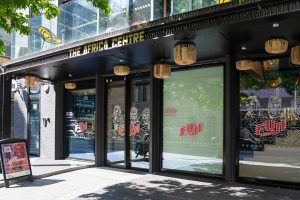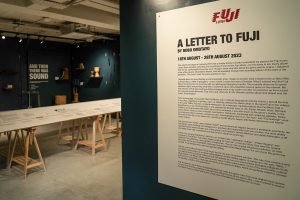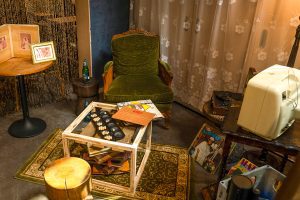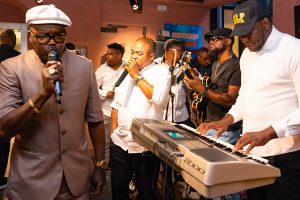NATIVE Exclusive: Bobo Omotayo’s Multidimensional Vision of Fuji
Taking the thrilling, complex story of a storied genre and culture to the world.
Taking the thrilling, complex story of a storied genre and culture to the world.
The history of Nigerian music isn’t complete without an understanding of its component parts. Of those parts, Fuji is a towering cornerstone. The genre which evolved from the Islamic prayer rites, Ajisari and Were, is musically vibrant, draws from the deepest wells of Yoruba culture, and has greatly influenced modern Nigerian pop. A testament to its transcendent influence is its fan base it enjoys across Nigeria and in the diaspora, which is the next focus for Bobo Omotayo, who is the creator of ‘Fuji: A Opera.’
At the height of the pandemic in 2020, Omotayo “had a lot of time on his hands,” he shared with The NATIVE on a recent weekday. Being a culture custodian, he decided to tell some stories he’s had on his mind for a while. The origin and phenomena that is Fuji presented a good place to start. “There was basically nothing online,” he said of his time researching the culture of Fuji, especially when one goes beneath the surface of its contemporary endurance. A lot of its intricacies were lost to time, either through disinterest in its narrative or a dearth of its knowledgeable custodians. The former was the case.
To further accentuate his ideas, Bobo brought in his brother Papa Omotayo and his friend, Tosin Ashafa, who both acted as investors and creative partners. A lot of reaching out was done, knowing that bringing such a powerful narrative onto the landscape of today’s popular culture would need heavy lifting. From collaborating with the genre’s living greats, to seeking information from university professors and traditional rulers, down to the important establishing corporate alliances which propelled the message even further, Lagos state—and by natural extension the national cultural space—felt the impact of ‘Fuji: A Opera’, especially in the subsequent months and years.
View this post on Instagram
Storytelling was the ethos of Bobo and his team. To bring both old and new lovers into Fuji’s sprawling existence, the information to be presented had to be bit-sized and entertaining. An exhibition at the Ikoyi-based Alliance Francaise (another one of their partners) resolved that need, but even more striking was the experiential scope of its design. Austere funnel-styled speakers softly played the music of each great, located on one part of the wall. Elaborate lace materials usually worn by Fuji practitioners adorned another wall, there were pictures, memorabilia, and written information on several facets of the culture, such as the biography of the Fuji pioneer Ayinde Barrister, the genre’s memorable artist clashes over the years, and the wisdom of its spoken word. It was a world unto itself.
This exhibition happened for a week, and included a panel discussion which featured K1 De Ultimate, who, for an hour, revealed how far the genre has taken him and several others, which is supplied by its overall culture, both sonic and visual. A grand concert capped off the event, as K1, Saheed Osupa, Malaika and several other Fuji stars performed. The platform also gave rising Fuji acts a chance to perform in front of luminaries.
For Bobo Omotayo, ‘Fuji: A Opera’ is an extension of interests he cultivated much earlier in life. He was a reader, who then began writing seriously around a decade ago, publishing his first book ‘London Life, Lagos Living’, which collected short poignant observations about life in the Nigerian city. In 2015 the book was made into a stage play by Make It Happen productions, and starred established figures such as Kate Henshaw, Funke Akindele, Lami Phillips and several others. ‘Honourable’, his second title, was published in 2017, a satire which revealed the intricacies of an actual political campaign the author took part in and interweaving them with fictional premise.

From these entries, Omotayo’s love for cultural endeavours spring forth, and the tinkering in-between mediums is what makes them exciting pieces for public consumption. His next exploit is taking ‘Fuji: A Opera’ to the world, and he’s already in the motions of doing so. Since the 18th of this month, the London exhibition has been taking place. “We’ve taken over four floors at the African Centre,” says Bobo, “where people can sort of start the journey of Fuji, how it started in the 1950s and how it’s evolved over the last seven decades to where it is now. On the fourth floor we’ve actually imagined what Fuji would look like in future, because for me, this is a genre that would transcend my time, and probably my children’s time, so for us, it’s really about, How do we keep this thing going?”
As ever, Bobo Omotayo built on the blocks of what he’d already achieved previously. The Lagos exhibition was a learning experience for the group. “The London one is far richer in terms of content,” he says, “because when we did the Lagos showcase, we had space constraints and knowledge constraints. So, for the last two years, myself, a couple of academics, a couple of African Studies scholars, a couple of culture custodians, and of course, the Fuji music artists themselves, we’ve been partnering to really articulate the history”.
The ‘Fuji: A Opera’ experience aims to break more ground, according to Bobo. A documentary is currently in the works and a touring experience is taking the showcase to different parts of the world. As its creator likes to say, it’s a multi-dimensional experience that will keep looking for ways to tell the complex, thrilling story of Fuji.






